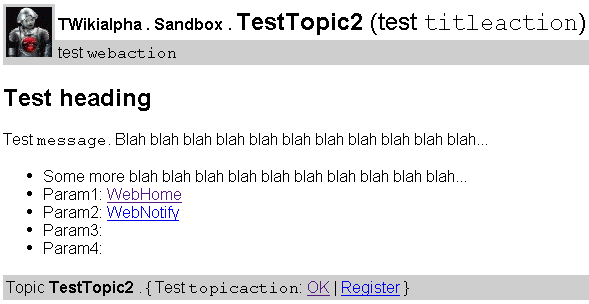 |
| TWiki.Tukro . TWiki . TWikiTemplates |
Definition of the templates used to render all HTML pages displayed in TWiki
The new modular template system offers flexible, easy control over the layout of all TWiki pages. The master template approach groups parts that are shared by several templates - like headers and footers - in a common file. Special variables allow individual layouts to include parts from a master template - variables are mixed with regular HTML mark-up for template-specific content. Templates are used to define page layout, and also to supplydefault content for new pages.
Where the old templates were each complete HTML documents, the new templates are defined using variables to include template parts from a master file. You can now change one instance of a common element to update all occurrences; previously, every affected template had to be updated. This simplifies the conversion of templates into XHTML format, and provides a more versatile solution for templates and for TWikiSkins. The new system:
&TWiki::Store::readTemplate() so that the caller simply gets an expanded template file (the same as before).
%TMPL:<key>% and %TMPL:<key>{"attr"}%.
%TMPL:INCLUDE{"file"}%: Includes a template file. The template directory of the current web is searched first, then the templates root (twiki/templates).
%TMPL:DEF{"var"}%: Define a variable. Text between this and the END directive is not returned, but put into a hash for later use.
%TMPL:END%: Ends variable definition.
%TMPL:P{"var"}%: Prints a previously defined variable.
twiki.tmpl, like twiki.print.tmpl, that redefines the header and footer.
All common parts are defined in a master template, twiki.tmpl, that all other templates use.
Template variable: Defines: %TMPL:DEF{"sep"}% "|" separator %TMPL:DEF{"htmldoctype"}% Start of all HTML pages %TMPL:DEF{"standardheader"}% Standard header (ex: view, index, seach) %TMPL:DEF{"simpleheader"}% Simple header with reduced links (ex: edit, attach, oops) %TMPL:DEF{"standardfooter"}% Footer, excluding revision and copyright parts %TMPL:DEF{"oops"}% Skeleton of oops dialog
There are two types of templates:
TWiki.Tukro uses HTML template files for all actions like topic view, edit, preview and so on. This allows you to change the look and feel of all pages by editing just some template files.
The template files are in the twiki/templates directory. As an example, twiki/templates/view.tmpl is the template file for the twiki/bin/view script. Templates can be overloaded per web. The following search order applies:
twiki/templates/$webName/$scriptName.tmpl
twiki/templates/$scriptName.tmpl
Note: $webName is the name of the web (ex: Main), and $scriptName is the script (ex: view).
Note: TWikiSkins can be defined to overload the standard templates.
Special variables are used in templates, especially in view, to display meta data.
Template topics define the default text for new topics. There are three types of template topics:
All template topics are located in the TWiki web. The WebTopicEditTemplate can be overloaded. The following search order applies when you create a new topic:
Topic Name: What it is: WebTopicViewTemplate Help text shown when you view a non existing topic. WebTopicNonWikiTemplate Help text shown when you view a non existing topic that has not a WikiName. WebTopicEditTemplate Default text shown when you create a new topic.
templatetopic CGI parameter.
Here is an example for creating new topics based on a specific template topic:
Above form asks for a topic name. A hidden input tag of name "templatetopic" specifies the ExampleTopicTemplate as the template topic. Here is the HTML source of the form:
<form name="new" action="%SCRIPTURLPATH%/edit%SCRIPTSUFFIX%/%WEB%/">
* New example topic:
<input type="text" name="topic" value="ExampleTopic%SERVERTIME{$yearx$mox$day}%" size="23" />
<input type="hidden" name="templatetopic" value="ExampleTopicTemplate" />
<input type="hidden" name="onlywikiname" value="on" />
<input type="submit" value="Create" />
(date format is <nop>YYYYxMMxDD)
</form>
The "onlywikiname" parameter enforces WikiWords for topic names.
Note: Use can use the %WIKIUSERNAME% and %DATE% variables in your topic templates as the signature; those variables are expanded when a new topic is created. The standard topic signature is:
-- %WIKIUSERNAME% - %DATE%
Attached is an example of an oops base template oopsbase.tmpl and a example oops dialog oopstest.tmpl which is based on the base template. NOTE: This isn't the release version, just a quick, simple demo.
The first line declares the delimiter variable called "sep", used to separate multiple link items. The variable can be called anywhere by writing %TMPL:P{"sep"}%
%TMPL:DEF{"sep"}% | %TMPL:END% <html> <head> <title> %WIKITOOLNAME% . %WEB% . %TOPIC% %.TMPL:P{"titleaction"}%</title> <base href="%SCRIPTURL%/view%SCRIPTSUFFIX%/%WEB%/%TOPIC%"> <meta name="robots" content="noindex"> </head> <body bgcolor="#FFFFFF"> <table width="100%" border="0" cellpadding="3" cellspacing="0"> <tr> <td bgcolor="%WEBBGCOLOR%" rowspan="2" valign="top" width="1%"> <a href="%WIKIHOMEURL%"> <img src="%PUBURLPATH%/wikiHome.gif" border="0"></a> </td> <td> <b>%WIKITOOLNAME% . %WEB% . </b><font size="+2"> <B>%TOPIC%</b> %TMPL:P{"titleaction"}%</font> </td> </tr> <tr bgcolor="%WEBBGCOLOR%"> <td colspan="2"> %TMPL:P{"webaction"}% </td> </tr> </table> --- ++ %TMPL:P{"heading"}% %TMPL:P{"message"}% <table width="100%" border="0" cellpadding="3" cellspacing="0"> <tr bgcolor="%WEBBGCOLOR%"> <td valign="top"> Topic <b>%TOPIC%</b> . { %TMPL:P{"topicaction"}% } </td> </tr> </table> </body>
Each oops template basically just defines some variables and includes the base template that does the layout work.
%TMPL:DEF{"titleaction"}% (test =titleaction=) %TMPL:END% %TMPL:DEF{"webaction"}% test =webaction= %TMPL:END% %TMPL:DEF{"heading"}% Test heading %TMPL:END% %TMPL:DEF{"message"}% Test =message=. Blah blah blah blah blah blah blah blah blah blah blah... * Some more blah blah blah blah blah blah blah blah blah blah... * Param1: %PARAM1% * Param2: %PARAM2% * Param3: %PARAM3% * Param4: %PARAM4% %TMPL:END% %TMPL:DEF{"topicaction"}% Test =topicaction=: [[%WEB%.%TOPIC%][OK]] %TMPL:P{"sep"}% [[%TWIKIWEB%.TWikiRegistration][Register]] %TMPL:END% %TMPL:INCLUDE{"oopsbase"}%
With URL: .../bin/oops/Sandbox/TestTopic2?template=oopstest¶m1=WebHome¶m2=WebNotify
.tmpl filename extension - it contains unresolved %VARIABLES%, but can still be previewed directly in a browser.
-- PeterThoeny - 23 Jul 2001
-- MikeMannix? - 14 Sep 2001
----- Revision r1.12 - 18 Jul 2002 - 07:20 - PeterThoeny
|